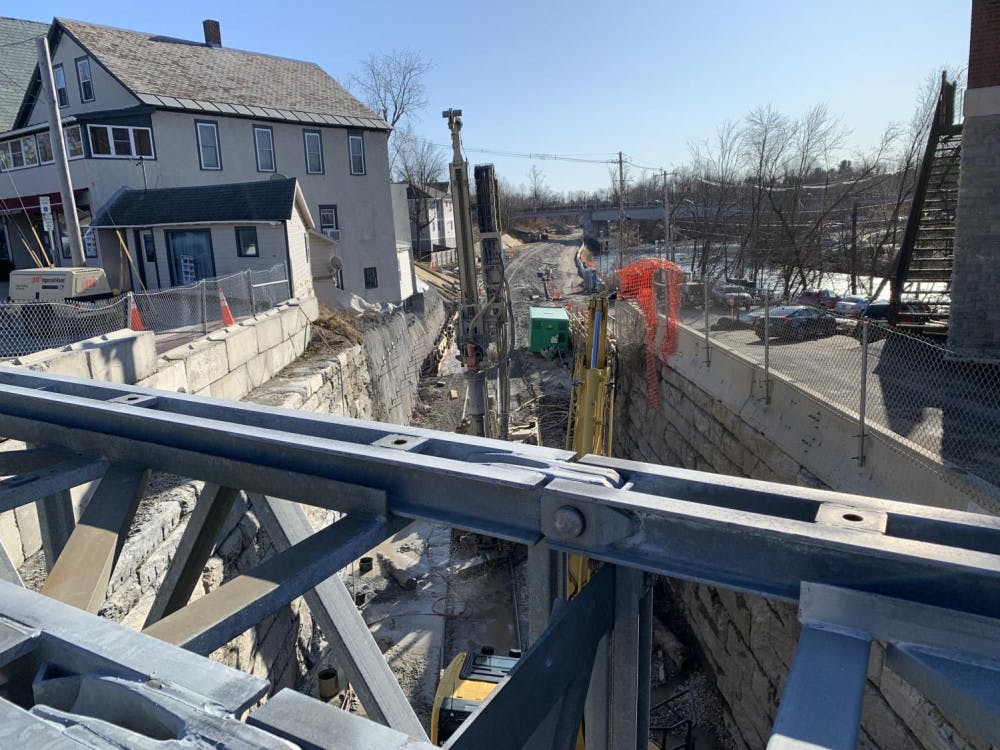The 10-week closures of Main Street and Merchants Row to through-traffic in downtown Middlebury will come to a long-awaited end this Friday, Sept. 18. These road closures, which coincide with the temporary shutdown of the town’s rail line and diversion of its freight traffic, are the “high-water mark” in the five-year Middlebury Bridge and Rail Project, according to the project’s community liaison, Jim Gish.
“The work in 2017, 2018, 2019 was all preparation work for this 10-week period,” Gish said. “This is the critical turning point of the project this week — kind of heading toward the finish line, which will happen next spring with the landscaping of two new parks downtown, and that will be the formal end of the project next July.”
One main purpose of the $71 million Bridge and Rail Project, which is managed by Vermont Agency of Transportation (VTrans), is the substitution of two deteriorating 1920s-era rail bridges in downtown Middlebury with a rail tunnel. The dilapidated bridges, which had sparked safety concerns, were demolished in 2017, and temporary modular steel bridges were built in their place.
Now, the temporary structures have been replaced with a passenger rail tunnel that returns the town green to its original size, which predates construction of the original rail line in the 1840s. The 3,500-foot downtown rail corridor that spans the distance between the Elm Street overpass and the trestle bridge over Otter Creek has been fully rebuilt at this point. This belowground construction of the rail line constitutes the other main purpose of the project.
The project was suspended late last March when Gov. Phil Scott decided to postpone construction statewide due to the Covid-19 pandemic. The project’s operations resumed in May, and the 10-week closure period, which was planned four years in advance to take place between May 27 and Aug. 5, was delayed by seven weeks and began on July 13.
“[The closures of Main Street and Merchants Row were] critical to be able to do all the work in this 10-week period that needed to be done,” Gish said. “The construction of the rail tunnel, the excavation of the rail corridor, repaving the roadways, new sidewalks for downtown. There’s a lot of activity that had to take place both aboveground and belowground during this 10-week period.”
Road closures during this period have complicated navigating downtown Middlebury on foot. Grassroots organization Neighbors, Together, along with VTrans project administrators and other local institutions, organizations and businesses collaborated to provide a free shuttle around the blockage, according to Mary-Claire Crogan, community relations manager at Addison Country Transit Resources (ACTR).
The ACTR-operated shuttle (dubbed Shuttlebury) runs continuously on a 15-minute loop around the town of Middlebury and stops at the municipal offices, Battell Block, Cannon Park, Congregational Church, Marble Works and Town Hall Theater. Walking maps with suggested routes are also included at each stop.
“Rides around the blockage were mutually desired by Neighbors, Together and the VTrans project managers,” Crogan told The Campus. “And actually, there is a federal requirement for the construction project to provide ADA access to downtown locations during the road closures. But the service is for everyone, regardless of physical ability.”
Shuttlebury was designed to transport the Middlebury population downtown to pre-planned events and incentivize them to visit the area at a time when local businesses might face a decline in patronage due to the road closures. However, in order to prevent the spread of Covid-19, those events were reevaluated and modified to be contactless.
Nevertheless, Shuttlebury has operated during the construction at its full schedule, with ACTR implementing new safety procedures and heightened sanitation protocols to prevent spread of the virus. Although Covid-19 concerns were likely responsible for decreased shuttle ridership this summer, Crogan wrote, “Shuttlebury attracted new riders who had never ridden the bus before. Maybe this will inspire them to ride transit more often.”
The Bridge and Rail Project funds the shuttle’s operation, so with the end of the 10-week construction period and road closures, Shuttlebury will come off the road this Friday. Crogan anticipates that the uniquely compact, ADA-accessible shuttle will be useful in the future to “access private driveways when people in wheelchairs need us to drive them to medical appointments.”
The end of this 10-week period means the advantages of finished construction for Middlebury’s local businesses are within sight.
“While there have certainly been concerns about the impact of the project on the economic vitality of downtown, in general, the community has accepted the value and benefit to the community of the project.” Gish said. “That’s probably particularly true right now as you can very visually see it taking shape . . . There’s now a level of anticipation and excitement at the revitalization taking place in our downtown.”
“[The pandemic] coincided with the hardest part and the most disruptive part of the project for downtown Middlebury,” Gish said, referencing the worries about the economic impact on closing downtown roadways to through traffic. “It’s helped us get it done at a time when it’s less disruptive to the downtown area.”
In addition to economic revitalization, benefits of the Bridge and Rail Project to the town of Middlebury include improvement in the safety of aboveground infrastructure like roadways and aging belowground infrastructure like water lines and sewer lines. Two new parks, including the expanded Triangle Park, which will have a mixture of hardscape and landscape as well as a plaza for events, will also result from the project.
Still, Gish acknowledged the challenges that this part of the construction project has caused for Middlebury residents.
“One of the things that has psychologically been a benefit to the community is the orderliness with which this project has progressed throughout this 10 weeks and really over the full life cycle of this project,” he said. “There’s been a steady and a very visible progression, which is in stark contrast to the world we’re living in today, which is full of unknowns and question marks and unknown finish lines.”

Becca Amen '22 is the Senior Local Editor.
She previously served as a Local editor, a staff writer and a copy editor.
Amen is a joint major in English and American Literatures and Philosophy.
During the summer of 2021, she interned at New England Review, where she recorded and produced an episode of their literary podcast. Her past stories include coverage on Ruth Hardy's run for Vermont State Senator and a report on the town of Middlebury's 2019 climate strike.
In addition to her work at The Campus, Amen hosts a radio show on WRMC, Middlebury's college radio, and serves as an editor for Middlebury's Blackbird art and literary journal.




